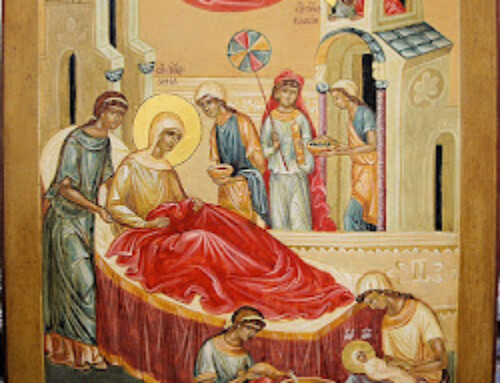Word Magazine December 1999 Page 14-15
THE FRUIT OF BARRENNESS
By Very Rev. Steven Rogers
In December, the landscape here around the church becomes stark, barren and seemingly lifeless. The lushness of the verdant countryside, vibrant in the summer with flowers, fruit and life, now lies dormant, appearing to be devoid of life. Looking at the barren landscape, it is hard to imagine that it was recently teeming, with life and that, soon, it will again.
That scene outside the church window reflects our inner life as Christians as well. As we travel through life as Christians there are times of lush, spiritual fruit. There are periods of spiritual growth when our relationship with God sprouts forth blossoms of joy in a spiritual springtime.
There are also those times of barrenness. Times when, like the December landscape, our inner life seems to be barren, bearing neither fruit nor life. In these times of barrenness, when no life seems to dwell within us, we cry out longing for that spiritual fruit to blossom once again. We plead that God would rescue us from a state of being barren without spiritual fruit. We see barrenness as a state from which we must escape.
On the ninth day of this month, we hear such a cry from Anna, she who on this day becomes the mother of the Mother of God. On this day, the church celebrates the Conception of the holy Theotokos by the Righteous Anna, the mother of the Mother of God.
The Righteous Joachim and Anna lived righteously, seeking to serve God in humility. As they reached old age, there was one thing they lacked, for God had not granted them a child. Church tradition tells us this godly couple endured much pain and humiliation from the reproach of those around them, who saw their barrenness as something lacking or even a curse. The hymns of the feast tell us that Joachim and Anna cried out to the Lord to “make the barren fruitful,” to “make the fruitless fruitful.” Joachim and Anna prayed fervently that their barrenness might end so that “we might offer the child unto Thee as a gift.”
We know that Joachim and Anna’s prayers were indeed answered. Nine months from now, Mary, the Mother of God, was born. True to their word, Mary’s parents dedicated their child to God, presenting her at an early age to be raised in the Temple.
When the fullness of time had come, Mary, in turn, gave birth to the Savior of the world.
When Anna conceived, not only was her barrenness brought to an end, but the barrenness of all mankind was being brought to an end. For the fruit of Anna’s womb would be she from whom the salvation of mankind would come. “Adam, behold your renewal! Eve, exult with joy! The barren, waterless land has produced the most beautiful fruit. She will bring forth the Bread of Immortality for the world, which will bring all barrenness to an end … “ (Sessional Hymn of the Feast).
There is a great lesson to be learned from the barrenness of Anna. Yes, it was a time of pain and difficulty. Yes, it was a time of sorrow. But it was also a time of preparation. Anna’s barrenness brought her to a place of total dependence on God. Anna’s barrenness brought her to a place where she desired to dedicate any “fruit” she might have totally to God and his purposes.
If Anna had given birth as a young woman, had there been no time of barrenness, then perhaps Anna would not have been so willing to dedicate her child to God. Her barrenness was a time of preparation so that when it did end, all that was borne in her life was given freely to God.
So it is with us. When we encounter times of barrenness, should we despair? Should we seek to escape as quickly as possible? or could it be that God is preparing us? Just as Anna’s time of barrenness brought her to the point of total dependence on God and a willingness to give all she had to God, so too, our times of barrenness can be given for the same purpose.
It was to the barren places that the monks of the Middle East went to discern God’s will and bear fruit for His glory. It was in the desert that Christ overcame the temptations of the devil.
If we can see times of seeming spiritual barrenness as times of preparation, as times when God is preparing us to turn over all our “fruits” to Him, then, like Anna, we will eventually bear fruit that will not only bring an end to our barrenness, but we will become vessels through which fruit planted by God will end the barrenness of those around us, bringing joy and gladness where there was once sorrow and despair.

